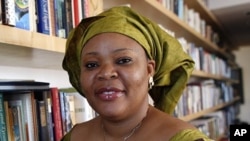The woman selected by President Ellen Johnson Sirleaf to help bring about peace and reconciliation in Liberia says she’s prepared for the task.
Leymah Gbowee, co-winner of the 2011 Nobel Peace Prize, says Liberia’s inability over the years to approach the issue of reconciliation directly has been adding layer upon layer of irreconcilable issues to the national agenda.
President Sirleaf asked Gbowee to head the National Peace and Reconciliation Initiative following the November 7 pre-election violence between police and supporters of the opposition Congress for Democratic Change.
Gbowee said she intends to solicit the views of all Liberians.
“When I won the Nobel Peace Prize, I said I wanted to use the prize, specifically in Liberia, to promote peace and reconciliation because I was quite aware of the challenges that we as a nation face when it comes to reconciling our differences,” she said.
Gbowee says she recognizes that the task of reconciling national differences would be a tall order. But, she says there is no special course or prescription for success.
She said she has been in touch with Liberians across the spectrum, as well as retired Anglican South African Archbishop Desmond Tutu. After the fall of apartheid, Tutu headed the South African Truth and Reconciliation Commission.
“Reconciliation is a personal, internal, collective journey that people must decide they are going to take, and I think Liberians are at that place where they want to move forward. Having said that, I’ve been in touch with Archbishop Desmond Tutu’s office because I see the “Arch” as one of those individuals who have all of the experiences when it comes to talking about reconciliation,” she said.
Gbowee says all issues that have divided Liberians over the years – from the country’s 1985 presidential election to the civil war, and now the 2011 presidential election – will form part of her reconciliation agenda.
“The one thing that we are seeing happening is that our inability to approach the whole issue of reconciliation head on has been adding more train to that gown. So, we have one package – the issues of the war that haven’t been addressed and the issues of elections over the past few years. Some of the other issues are disempowerment, the huge population of young people who cannot find jobs,” Gbowee said.
During Liberia’s civil war, Gbowee brought together several dozen Christian and Muslim women who rose up together to help put an end to the country’s civil war.
Gbowee says she will be calling not only on the women but every segment of society to join her for peace and reconciliation.
She says she will launch the Liberia peace and reconciliation initiative on November 29, the traditional end of the raining season and the beginning of the dry season in Liberia by holding a cultural peace jamboree called “The One Liberia Reconciliation Festival.”
“For me, using that particular day as the day to begin the whole process of reconciliation is that the rains of the war, the rains of the divisiveness, the rains of the insults that we saw over the last years or few months of politics of Liberia, in my opinion, are passing and we should all ask Liberians to look forward to the sun of peace,” Gbowee said.
Some Liberians have already begun to suggest that Gbowee cannot be an impartial reconciler because she is too close to President Sirleaf.
Gbowee says, as an African feminist who has advocated for the inclusion of women in politics, she has supported all Liberian women irrespective of their political affiliations.
“I voted across the line for women. If that is going to cloud the level of work that I am supposed to do to reconcile Liberia, then the first step for me is to say, ‘I’m sorry.’ And, if we have a huge segment of society who believe that I’m not going to be a reconciler, let them speak out now because I cannot initiate a process of reconciliation in Liberia without the participation of every one,” Gbowee said.
The 39-year-old Gbowee would not rule out whether she intends to run for political office.
“I’ve always maintained that I am a politician by nature. On which level I will intend to engage in the politics of Liberia, I’m still thinking. Remember, I’m just 39, and I have a whole decade or two ahead of me to step onto the political stage. So, yes, I may decide I want to go into parliament, but, for now, the task of reconciling Liberia first and the task of continuously working for the empowerment of women and the young people of that country is what I love doing; it’s what keeps my adrenaline pumping,” Gbowee said.
















